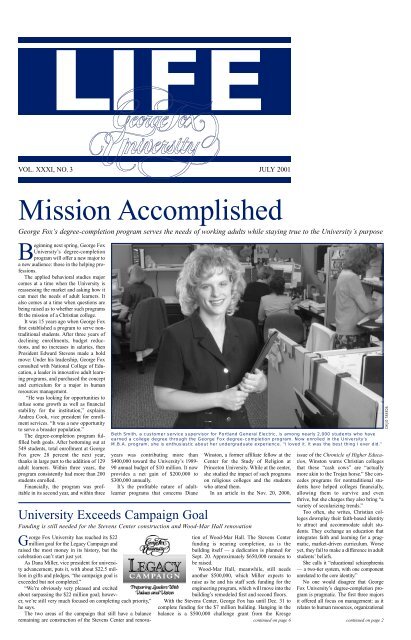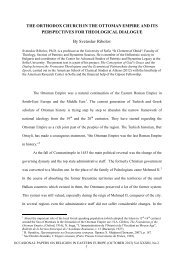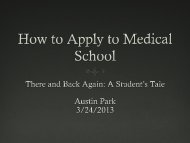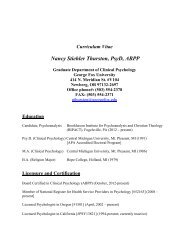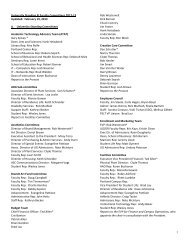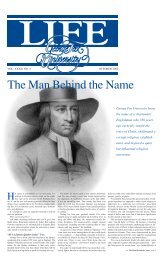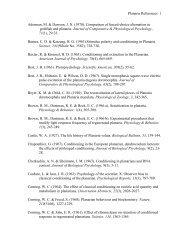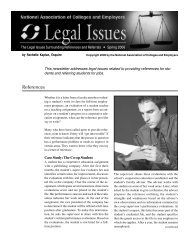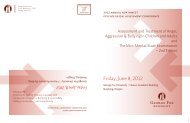Mission Accomplished - George Fox University
Mission Accomplished - George Fox University
Mission Accomplished - George Fox University
You also want an ePaper? Increase the reach of your titles
YUMPU automatically turns print PDFs into web optimized ePapers that Google loves.
LIFE<br />
VOL. XXXI, NO. 3 JULY 2001<br />
<strong>Mission</strong> <strong>Accomplished</strong><br />
<strong>George</strong> <strong>Fox</strong>’s degree-completion program serves the needs of working adults while staying true to the <strong>University</strong>’s purpose<br />
Beginning next spring, <strong>George</strong> <strong>Fox</strong><br />
<strong>University</strong>’s degree-completion<br />
program will offer a new major to<br />
a new audience: those in the helping professions.<br />
The applied behavioral studies major<br />
comes at a time when the <strong>University</strong> is<br />
reassessing the market and asking how it<br />
can meet the needs of adult learners. It<br />
also comes at a time when questions are<br />
being raised as to whether such programs<br />
fit the mission of a Christian college.<br />
It was 15 years ago when <strong>George</strong> <strong>Fox</strong><br />
first established a program to serve nontraditional<br />
students. After three years of<br />
declining enrollments, budget reductions,<br />
and no increases in salaries, then<br />
President Edward Stevens made a bold<br />
move: Under his leadership, <strong>George</strong> <strong>Fox</strong><br />
consulted with National College of Education,<br />
a leader in innovative adult learning<br />
programs, and purchased the concept<br />
and curriculum for a major in human<br />
resources management.<br />
“He was looking for opportunities to<br />
infuse some growth as well as financial<br />
stability for the institution,” explains<br />
Andrea Cook, vice president for enrollment<br />
services. “It was a new opportunity<br />
to serve a broader population.”<br />
The degree-completion program fulfilled<br />
both goals. After bottoming out at<br />
549 students, total enrollment at <strong>George</strong><br />
<strong>Fox</strong> grew 28 percent the next year,<br />
thanks in large part to the addition of 129<br />
adult learners. Within three years, the<br />
program consistently had more than 200<br />
students enrolled.<br />
Financially, the program was profitable<br />
in its second year, and within three<br />
Winston, a former affiliate fellow at the<br />
Center for the Study of Religion at<br />
Princeton <strong>University</strong>. While at the center,<br />
she studied the impact of such programs<br />
on religious colleges and the students<br />
who attend them.<br />
In an article in the Nov. 20, 2000,<br />
<strong>University</strong> Exceeds Campaign Goal<br />
Funding is still needed for the Stevens Center construction and Wood-Mar Hall renovation<br />
Beth Smith, a customer service supervisor for Portland General Electric, is among nearly 2,000 students who have<br />
earned a college degree through the <strong>George</strong> <strong>Fox</strong> degree-completion program. Now enrolled in the <strong>University</strong>’s<br />
M.B.A. program, she is enthusiastic about her undergraduate experience. “I loved it. It was the best thing I ever did.”<br />
years was contributing more than<br />
$400,000 toward the <strong>University</strong>’s 1989-<br />
90 annual budget of $10 million. It now<br />
provides a net gain of $200,000 to<br />
$300,000 annually.<br />
It’s the profitable nature of adultlearner<br />
programs that concerns Diane<br />
<strong>George</strong> <strong>Fox</strong> <strong>University</strong> has reached its $22<br />
million goal for the Legacy Campaign and<br />
raised the most money in its history, but the<br />
celebration can’t start just yet.<br />
As Dana Miller, vice president for university<br />
advancement, puts it, with about $22.5 million<br />
in gifts and pledges, “the campaign goal is<br />
exceeded but not completed.”<br />
“We’re obviously very pleased and excited<br />
about surpassing the $22 million goal; however,<br />
we’re still very much focused on completing each priority,”<br />
he says.<br />
The two areas of the campaign that still have a balance<br />
remaining are construction of the Stevens Center and renovation<br />
of Wood-Mar Hall. The Stevens Center<br />
funding is nearing completion, as is the<br />
building itself — a dedication is planned for<br />
Sept. 20. Approximately $650,000 remains to<br />
be raised.<br />
Wood-Mar Hall, meanwhile, still needs<br />
another $500,000, which Miller expects to<br />
raise as he and his staff seek funding for the<br />
engineering program, which will move into the<br />
building’s remodeled first and second floors.<br />
With the Stevens Center, <strong>George</strong> <strong>Fox</strong> has until Dec. 31 to<br />
complete funding for the $7 million building. Hanging in the<br />
balance is a $500,000 challenge grant from the Kresge<br />
continued on page 6<br />
issue of the Chronicle of Higher Education,<br />
Winston warns Christian colleges<br />
that these “cash cows” are “actually<br />
more akin to the Trojan horse.” She concedes<br />
programs for nontraditional students<br />
have helped colleges financially,<br />
allowing them to survive and even<br />
thrive, but she charges they also bring “a<br />
variety of secularizing trends.”<br />
Too often, she writes, Christian colleges<br />
downplay their faith-based identity<br />
to attract and accommodate adult students.<br />
They exchange an education that<br />
integrates faith and learning for a pragmatic,<br />
market-driven curriculum. Worse<br />
yet, they fail to make a difference in adult<br />
students’ beliefs.<br />
She calls it “educational schizophrenia<br />
— a two-tier system, with one component<br />
unrelated to the core identity.”<br />
No one would disagree that <strong>George</strong><br />
<strong>Fox</strong> <strong>University</strong>’s degree-completion program<br />
is pragmatic. The first three majors<br />
it offered all focus on management: as it<br />
relates to human resources, organizational<br />
continued on page 2<br />
CHIJO TAKEDA
2<br />
<strong>Mission</strong>: Curriculum, format encourage faith-based discussions<br />
continued from page 1<br />
leadership, and incorporating instruction<br />
in information technology. But the program<br />
also has both a curriculum and a format<br />
that encourages the integration of<br />
faith and learning.<br />
Efforts to ensure the degree-completion<br />
program fits the <strong>University</strong>’s mission<br />
began when the curriculum was<br />
acquired back in 1986.<br />
Unlike other programs that require<br />
working adults to finish their degrees by<br />
taking traditional courses at nontraditional<br />
times, the <strong>George</strong> <strong>Fox</strong> degreecompletion<br />
program operates on a cohort<br />
model — the first of its kind in the<br />
region. Students with two to three years<br />
of college credit progress through a specific<br />
sequence of courses together with<br />
the same group of 15 to 20 classmates,<br />
guided by a primary instructor.<br />
Right from the start, the <strong>University</strong><br />
made the innovative program its own.<br />
“We added courses that were unique to<br />
us,” says Cook. “Christian Faith and<br />
Thought very specifically addresses the<br />
Christian faith and how it informs our culture<br />
and how it informs us as individuals.<br />
We also added a business ethics course<br />
that brings into the classroom the perspective<br />
of Christian ethics in the workplace.”<br />
Also added were a handful of Saturday<br />
seminars that allow the <strong>University</strong> to<br />
give more of a liberal arts component to<br />
the curriculum and to explore the influence<br />
of the Friends church.<br />
Robin Ashford, of Dundee, Ore.,<br />
graduated in April with a major in man-<br />
LIFE STAFF<br />
Editor<br />
Anita Cirulis<br />
Contributing Writers<br />
Blair Cash<br />
Anita Cirulis<br />
Rob Felton<br />
John Fortmeyer<br />
Barry Hubbell<br />
Photographers<br />
Anita Cirulis<br />
Kirk Hirota<br />
Craig Strong<br />
Chijo Takeda<br />
Designer<br />
Colin Miller<br />
<strong>George</strong> <strong>Fox</strong> <strong>University</strong> LIFE (USPS 859-<br />
820) is published four times a year by<br />
<strong>George</strong> <strong>Fox</strong> <strong>University</strong>, 414 North Meridian<br />
Street, Newberg, Oregon, 97132-<br />
2697, USA. Periodicals postage paid at<br />
Newberg, Oregon. Postmaster: Send<br />
address changes to LIFE, <strong>George</strong> <strong>Fox</strong><br />
<strong>University</strong>, 414 N. Meridian St. #6069,<br />
Newberg, OR 97132-2697.<br />
Please send letters, alumni news, and<br />
address changes to LIFE, <strong>George</strong> <strong>Fox</strong><br />
<strong>University</strong>, 414 N. Meridian St. #6069,<br />
Newberg, OR 97132-2697.<br />
Phone: 503-554-2126. Use our<br />
Web site: www.georgefox.edu/alumni,<br />
and click “Staying in Touch.”<br />
E-mail: alumni@georgefox.edu.<br />
GEORGE FOX UNIVERSITY<br />
ADMINISTRATION<br />
President<br />
H. David Brandt<br />
Vice President for Financial Affairs<br />
Donald J. Millage<br />
Vice President for Academic Affairs<br />
Robin E. Baker<br />
Vice President for Enrollment Services<br />
Andrea P. Cook<br />
Vice President for Advancement<br />
Dana L. Miller<br />
Vice President for Student Life<br />
Bradley A. Lau<br />
Executive Assistant to the President<br />
Barry A. Hubbell<br />
agement and organizational<br />
leadership. The sixweek<br />
Christian Faith and<br />
Thought course, she says,<br />
involved reading from<br />
such sources as the Bible<br />
and C.S. Lewis, as well as<br />
There’s no attempt to downplay<br />
the <strong>University</strong>’s identity to<br />
attract or accommodate adult<br />
learners, says Mark Ocker,<br />
director of the department of<br />
professional studies. “We let<br />
our students know right up<br />
front that we are a Christian<br />
institution and that we are<br />
Christians ourselves. We say<br />
that unashamedly.”<br />
The More Things Change . . .<br />
Every university seeks to leave a distinctive “brand” on<br />
its alumni. Faculties spend untold hours discussing<br />
what makes their curriculum special. Parents of prospective<br />
students want to know how this particular university will<br />
impact their daughter or son. When institutions change, the<br />
various constituencies want to be assured the institution<br />
they care about will maintain its special character.<br />
<strong>George</strong> <strong>Fox</strong> <strong>University</strong> has changed a lot over the past<br />
15 years. The most obvious change is the institution’s size.<br />
The student body is more than four times the size it was in<br />
1986. While the size change is obvious, there also have<br />
been other changes. We now function in several different<br />
locations — Portland, Boise, Eugene, and Salem. Other<br />
sites are under consideration. The most noticeable change<br />
observed by alumni from the “good old days” is that<br />
<strong>George</strong> <strong>Fox</strong> no longer is a university of only traditionalaged<br />
undergraduates. Today, approximately 45 percent of<br />
students are in graduate and nontraditional programs.<br />
Change at <strong>George</strong> <strong>Fox</strong> <strong>University</strong> has brought many<br />
positive results. We are more attractive to more students<br />
because we are able to offer more choices. We have<br />
improved the academic quality of the programs we offer,<br />
and students have easier access to better technology than<br />
was available not many years ago.<br />
But does <strong>George</strong> <strong>Fox</strong> <strong>University</strong> continue to put its distinctive<br />
“stamp” on graduates of all its programs? All the<br />
positive aspects of change would not be worth it if the special<br />
features of a <strong>George</strong> <strong>Fox</strong> education were lost. Is integration<br />
of the Christian faith with learning evident in all<br />
programs? Is it clear to all students that we value all people<br />
because of our Christian commitment? These distinctives<br />
must not be lost or minimized in any way.<br />
Such questions are crucial to the quality of education at<br />
theological discussions<br />
and papers she called her<br />
“most difficult and most<br />
rewarding.”<br />
“There is so much<br />
interaction between the<br />
members throughout the<br />
months, and the courses<br />
are structured to encourage<br />
dialogue in a manner<br />
which causes us to talk not only about<br />
how we would implement what we are<br />
learning in our management courses, but<br />
also why we make the decisions we do,”<br />
she says. “This type of dialogue oftentimes<br />
would lead to discussions which<br />
were very much faith-based.”<br />
Because the course is taught at the end<br />
of the program, she says, “a level of trust<br />
has been developed between the cohort<br />
members which makes it possible to help<br />
each other with the difficult task of<br />
objectively looking at worldviews and<br />
respectfully responding to each other’s<br />
personal beliefs.”<br />
Those worldviews can be numerous.<br />
Mark Ocker, who has taught adult learners<br />
at <strong>George</strong> <strong>Fox</strong> for three years and will<br />
become the program’s director in August,<br />
says he has had cohort groups in which<br />
80 percent of his students had no religious<br />
affiliation and little, if any, basic<br />
understanding of the Christian faith.<br />
Despite that, he says, there’s no temptation<br />
to downplay the <strong>University</strong>’s identity<br />
to attract or accommodate adult<br />
learners, as Winston alleges in her article.<br />
“We let our students know right up<br />
front that we are a Christian institution<br />
and that we are Christians ourselves. We<br />
say that unashamedly.”<br />
Susan McNaught, an assistant professor<br />
of management in the program, agrees.<br />
“They all know this is a Christian<br />
school and that we are serious about it,”<br />
she says. “They also find that this is a<br />
safe place to explore their faith. I have<br />
had students dedicate or rededicate their<br />
lives to Christ. I have also had students<br />
who, on the surface, were not touched by<br />
our witness. I know that my job is to<br />
open the door. God does the rest of the<br />
work, and I have faith in his timing.”<br />
The faith-based nature of the degreecompletion<br />
program is the reason some<br />
students choose <strong>George</strong> <strong>Fox</strong> <strong>University</strong>.<br />
“A lot of our students, although they<br />
aren’t Christians, are driven by values,”<br />
Ocker explains. “They often tell me<br />
that’s what they see missing in many of<br />
our competitors’ programs. They come<br />
because of our values. There seems to be<br />
within them an awareness that there’s<br />
something possibly missing in their lives.<br />
<strong>George</strong> <strong>Fox</strong> <strong>University</strong>. I enjoy talking with and hearing<br />
from alumni from the various nontraditional programs.<br />
Eileen Qutub, former Oregon state senator, speaks highly<br />
of her experience in our degree-completion program.<br />
Her address at the December<br />
2000 commencement ceremony<br />
demonstrated the integration of<br />
her Christian commitment with<br />
President<br />
David Brandt<br />
They come with a little bit of fear and<br />
trembling, but once they’re in the program,<br />
they find it’s a safe environment.”<br />
Cole Chatterton, a client account<br />
manager for the Xerox Corporation in<br />
Portland, talks about getting “the full<br />
package” when he explains why he chose<br />
the <strong>George</strong> <strong>Fox</strong> degree-completion program.<br />
Important to him were the <strong>University</strong>’s<br />
national ranking, cutting-edge<br />
major in management and information<br />
technology, and religious foundation.<br />
He remembers a professor telling him,<br />
“If you’re coming to <strong>George</strong> <strong>Fox</strong> just to<br />
get a degree and make more money, you<br />
might not want to come. If you’re coming<br />
for a life-learning experience and transformation,<br />
then come to <strong>George</strong> <strong>Fox</strong>.”<br />
“It was the most poignant thing I ever<br />
heard,” Chatterton says. “That actually<br />
capsulizes <strong>George</strong> <strong>Fox</strong>. They’re not there<br />
to make you rich and famous. They’re<br />
there to make you a better person.”<br />
While values are important to adult<br />
learners, students invest their time, effort,<br />
and finances in a <strong>George</strong> <strong>Fox</strong> degree<br />
because of the education they receive.<br />
They choose the degree-completion program<br />
because of the <strong>University</strong>’s strong<br />
academic reputation and — once enrolled<br />
— find it is well deserved.<br />
Beth Smith, of Molalla, Ore., a supervisor<br />
in customer service for Portland<br />
General Electric (PGE) heard from several<br />
other PGE employees who had gone<br />
through the program “how great an education<br />
they had received.” She graduated<br />
with a major in management and organizational<br />
leadership this spring — receiving<br />
a promotion while earning her degree<br />
— and is now enrolled in the <strong>University</strong>’s<br />
M.B.A. program.<br />
continued on page 5<br />
her public life. Similarly, I<br />
received a letter with a contribution<br />
from an alumna who told of<br />
the powerful experience she had<br />
in the <strong>George</strong> <strong>Fox</strong> M.A.T. program<br />
where, for the first time, she<br />
was helped to think about integrating<br />
her faith with her academic<br />
learning.<br />
I could continue with such stories. The method of teaching<br />
and learning is not necessarily the same in many of our<br />
nontraditional programs, but the Christian commitment of<br />
our faculty and the relevance of this commitment to the<br />
material being taught is very clear in every program.<br />
It is essential for us to make sure our mission is never<br />
compromised in any program — nontraditional or traditional.<br />
From our beginning, our purpose has always been<br />
“to demonstrate the meaning of Jesus Christ by offering a<br />
caring educational community in which each individual<br />
may achieve the highest intellectual and personal growth,<br />
and by participating responsibly in our world’s concerns.”<br />
Methods may vary, but our goal remains the same.
3<br />
The Abominable ‘No’ Man<br />
Quick to say no to overspending, vice president for financial affairs Don Millage retires<br />
after guiding <strong>George</strong> <strong>Fox</strong> through nearly three decades of balanced budgets<br />
Nearly every time chemistry professor<br />
Paul Chamberlain came to<br />
see Don Millage, he was met at<br />
the office door with the same greeting.<br />
“No.”<br />
The lighthearted welcome became a<br />
running joke for those who often came to<br />
make budget requests of Millage, <strong>George</strong><br />
<strong>Fox</strong>’s 69-year-old vice president for<br />
financial affairs. It started the conversation<br />
off right, says Millage, who retires<br />
this summer with a tightfisted reputation<br />
and a remarkable record of nearly three<br />
decades of consecutive balanced university<br />
budgets.<br />
Since leaving Wall Street to take a 40<br />
percent salary cut and the financial<br />
responsibilities of a debt-ridden college<br />
in 1972, Millage has given <strong>George</strong> <strong>Fox</strong><br />
nearly 30 years of fiscal stability. His<br />
departure will end a three-decade era that<br />
saw <strong>George</strong> <strong>Fox</strong>’s budget increase from<br />
$1.2 million to $35 million and its student<br />
population swell from 443 to 2,630.<br />
Under three presidents and two interim<br />
presidents, Millage applied his dry<br />
wit, tireless devotion, and intense passion<br />
to keeping hundreds of employees<br />
from spending more money than the <strong>University</strong><br />
possessed. He has been described<br />
as the backbone of the <strong>University</strong>, but his<br />
penchant for denying budget requests led<br />
him to come up with a self-composed<br />
nickname: The Abominable “No” Man.<br />
Saying “no” came naturally to Millage, he says. “I<br />
learned it young and practiced it often.” Born during the<br />
Depression to an itinerant carpenter, Millage spent his<br />
teen years in the southern Oregon town of Talent. “We<br />
never had much in those years. I grew up frugal. It was<br />
easy to say no to things that seemed like luxuries to me,<br />
because I never had it.”<br />
Five-foot-nine and silver-haired, Millage could stare<br />
through his glasses and inspire fear.<br />
Clyde Thomas, director of plant services, recalls the<br />
first time he reported to Millage, he brought his office<br />
manager — for moral support.<br />
“I was feared far more than I should have been,” says<br />
Millage. “When people got to know me, they weren’t<br />
afraid of me. But I may have seemed somewhat aloof<br />
and cold.”<br />
Dave Kelley, assistant vice president for finance, has<br />
worked for Millage for eight years and has seen his softer<br />
side. “He cared for his staff not by what he said, but<br />
by taking up the slack,” says Kelly. “He wasn’t quick to<br />
(offer pleasantries) — that’s not his personality — but<br />
he showed he cared.”<br />
“When he was working, he was pretty serious,” says<br />
Karon Bell, assistant vice president for administration,<br />
“But on break, he would be funny. Few people saw<br />
that.”<br />
Millage’s humor also surfaced when reporting at<br />
board meetings and year-end campus meetings. Audiences<br />
would roar at the witty commentary he weaved<br />
into the budget numbers.<br />
While at <strong>George</strong> <strong>Fox</strong>, Millage has also been an active<br />
early-morning racquetball player. He occasionally<br />
attends Portland Trail Blazer games and holds <strong>University</strong><br />
of Oregon football season tickets. He has been a fixture<br />
at <strong>George</strong> <strong>Fox</strong> men’s basketball games since the<br />
mid-1970s, serving as volunteer scorekeeper.<br />
“I always knew when it was a game night,” says Bell,<br />
“because it was the only time he’d get out of the office<br />
on time.”<br />
Sports have been a lifelong passion for Millage. He<br />
quarterbacked his Talent high school football team,<br />
played second base on the baseball diamond, and came<br />
off the bench as a basketball guard. In track, he ran the<br />
dashes and set a state record for small-sized schools by<br />
leaping 20-feet-3 5 ⁄8 inches in the long jump.<br />
After high school, Millage enrolled as a pre-engineering<br />
major at what is now Southern Oregon <strong>University</strong>.<br />
Uncertain of his career goals after two years of<br />
Vowing that it would be his last day to wear a jacket and tie, Don Millage prepares to leave the desk he bought himself<br />
and used for 30 years. Described as “the backbone of the <strong>University</strong>,” Millage leaves a legacy of no-nonsense<br />
fiscal responsibility that has enabled <strong>George</strong> <strong>Fox</strong> to survive difficult economic times.<br />
classes, he volunteered for the Army. The military sent<br />
him into the Korean conflict, where he saw limited<br />
action in a heavy artillery unit during the six months<br />
before the armistice. “It was an interesting time,” he<br />
says. “Not one I’d want to duplicate.”<br />
Following his discharge from the Army in 1953, he<br />
began weekend trips to Newberg to see his high school<br />
sweetheart, Virginia Peters, then a student at <strong>George</strong><br />
<strong>Fox</strong>. In 1954, she received her teaching diploma, and<br />
they were married the next day.<br />
During their years at <strong>George</strong> <strong>Fox</strong>, Virginia made the<br />
Millage home a hospitable location for office gatherings<br />
and a haven for those in need. Their basement was frequently<br />
occupied by stranded students, new faculty, and<br />
visiting guest speakers. When cancer claimed her life in<br />
1992, the Virginia Millage Memorial Rose Garden was<br />
planted to bloom in her honor at the center of campus.<br />
In 1954, Millage enrolled at the <strong>University</strong> of Oregon.<br />
He recalled an accounting course at Southern Oregon<br />
that he had enjoyed taking. “I thought maybe I’d be<br />
a better accountant than an engineer.”<br />
After Millage earned his degree in business administration,<br />
he became a CPA with Price Waterhouse in<br />
Portland. His career took him to San Francisco and later<br />
to New York as national director of professional development.<br />
In his 16th year with Price Waterhouse, he received a<br />
late-night recruiting call from then <strong>George</strong> <strong>Fox</strong> President<br />
David LeShana. <strong>George</strong> <strong>Fox</strong> needed a business<br />
manager.<br />
“My immediate response was ‘no way,’” says Millage,<br />
who was 39. But he and his wife began to consider<br />
it. They had hoped Don might work at <strong>George</strong> <strong>Fox</strong><br />
eventually, and the idea of returning to the West Coast<br />
attracted them.<br />
“We finally decided, ‘Why wait for retirement?’” he<br />
says.<br />
Taking the post meant a salary drop from $30,000 to<br />
$18,000. When he arrived, in January of 1972, he<br />
bought his own desk, credenza, and chair as a donation<br />
to the college.<br />
He soon found a cardboard box filled with $50,000<br />
in overdue bills. “I didn’t expect to have to spend the<br />
first six months talking to irate creditors,” he says. Millage<br />
established department budgets that employees<br />
could depend on and began delivering the first of many<br />
“nos.” He brought fiscal discipline to the small campus<br />
and put the College in the black his first year.<br />
Millage says his highest career moment probably<br />
came a couple years later when lumberman James<br />
Miller donated $650,000 to the school. The donation<br />
eliminated the college’s unpaid bills, paid for muchneeded<br />
building repairs, and provided the start of a capital<br />
campaign that eventually built Ross Center and<br />
Wheeler Sports Center.<br />
His lowest career moments came during the economic<br />
recession in the late ’70s and early ’80s. His frugality<br />
became legendary. A tear in the business office<br />
rug was patched with duct tape. Low-set thermostats<br />
inspired shivering secretaries to wear open-fingered<br />
gloves even when typing. One secretary even thought it<br />
necessary to use up all the adding machine tape, reverse<br />
it, and run it through the other way. Half the bulbs in<br />
Wood-Mar light fixtures were removed to cut power<br />
costs.<br />
Bell remembers convincing Millage to replace his<br />
tattered office chair in the mid-1990s — the same chair<br />
he bought with his own money when he arrived on campus.<br />
He used the same desk and credenza throughout his<br />
<strong>University</strong> career.<br />
Even away from work, Millage spends hours crunching<br />
numbers on his home computer. Until eight years<br />
ago, he was treasurer of Newberg Friends Church, and<br />
until 1999 he managed the Friends’ pastors pension<br />
funds. Now he manages nearly 100 charitable trusts for<br />
the Northwest Yearly Meeting of Friends and <strong>George</strong><br />
<strong>Fox</strong>.<br />
Retiring with Millage is the elaborate Excel spreadsheet<br />
budgeting system that he created on his Macintosh<br />
in the late ’80s. The mammoth document takes up 700<br />
megabytes, enough to fill up almost 500 floppy disks.<br />
“When I tell people we’ve been managing a $35 million<br />
budget entirely on spreadsheets, they nearly fall off<br />
their chairs,” he says.<br />
Coinciding with his retirement, the <strong>University</strong> is purchasing<br />
a management software system and hiring Mike<br />
Goins to assume the post being vacated by Millage.<br />
Goins has held similar positions at Whitworth College,<br />
<strong>University</strong> of the Pacific, and West Virginia Wesleyan<br />
<strong>University</strong>.<br />
Millage’s spreadsheets and determination helped<br />
steer <strong>George</strong> <strong>Fox</strong> through difficult financial times that<br />
starved to death two of Oregon’s Christian colleges.<br />
Throughout, his philosophy has been simple: “Balanced<br />
budgets should be a way of life. I hope I’ve laid a foundation<br />
— in philosophy and reality — that gives the<br />
<strong>University</strong> the ability to grow and thrive.”<br />
— Rob Felton<br />
CHIJO TAKEDA
4<br />
Tops In Teaching<br />
Kathleen Gathercoal and Michele Johnson receive the 2001 teaching awards<br />
For the first time, two awards have<br />
been presented to <strong>George</strong> <strong>Fox</strong><br />
<strong>University</strong> faculty members for<br />
excellence in teaching.<br />
Added this year to the traditional Faculty<br />
Achievement Award for Undergraduate<br />
Teaching is a new award for graduate<br />
teaching.<br />
The doubling of awards acknowledges<br />
<strong>George</strong> <strong>Fox</strong>’s growth, with more programs<br />
serving a wider range of academic<br />
needs.<br />
The two winners share in an awardwinning<br />
passion to help students reach<br />
their potential. Winning the undergraduate<br />
teaching citation is Michele Johnson,<br />
associate professor of business. Receiving<br />
the first graduate teaching award is<br />
Kathleen Kleiner Gathercoal, associate<br />
professor of psychology.<br />
The honors were announced at the<br />
annual academic awards chapel, during<br />
which Gathercoal and Johnson each<br />
received a $2,500 award. Recipients of<br />
the annual honors are chosen by a panel<br />
of faculty and students.<br />
Gathercoal joined the <strong>George</strong> <strong>Fox</strong><br />
faculty in 1993. She previously<br />
taught at Indiana <strong>University</strong>-Purdue <strong>University</strong><br />
at Indianapolis. She completed<br />
her undergraduate work at Franklin &<br />
Marshall College in Lancaster, Pa., then<br />
earned both master’s and doctoral<br />
degrees in development psychology at<br />
Case Western Reserve <strong>University</strong> in<br />
Cleveland, Ohio.<br />
Among her areas of expertise are perception<br />
and memory, face perception and<br />
recognition, mental retardation, vision<br />
development in infants, and Quaker<br />
(Friends) higher education.<br />
Robin Baker, vice president for<br />
academic affairs, announced Gathercoal’s<br />
award.<br />
“The students who nominated Kathleen<br />
emphasized her thoroughness and<br />
attention to detail, and particularly her<br />
openness to students,” said Baker.<br />
“She cares. She really does,” says<br />
Brandy Liebscher, who earned bachelor’s,<br />
master’s, and doctoral degrees in<br />
psychology at <strong>George</strong> <strong>Fox</strong>. She has<br />
known Gathercoal for seven years and<br />
has long been impressed by her professor’s<br />
desire to help students succeed.<br />
Powers Receives<br />
Research Award<br />
Don Powers, professor of biology at <strong>George</strong><br />
<strong>Fox</strong> and a nationally recognized expert on<br />
birds, is recipient of the <strong>University</strong>’s first Faculty<br />
Researcher Award.<br />
The new award was announced during<br />
<strong>George</strong> <strong>Fox</strong>’s spring commencement. Powers<br />
received a $2,500 check — the same amount<br />
given annually to recipients of <strong>George</strong> <strong>Fox</strong>’s<br />
Faculty Achievement Award for excellence in<br />
teaching. While the award is a similar recognition<br />
of high-quality work, it focuses attention on<br />
a faculty’s member’s research efforts. Selected<br />
by the Faculty Development Committee, the<br />
award notes significant contribution to a professor’s<br />
field during the past academic year.<br />
In Powers’ case, the award notes his record<br />
of research and publishing in the field of<br />
ornithology specifically related to the physiology<br />
of hummingbirds. Powers also authored two<br />
chapters for Birds of North America, the chief<br />
research resource in ornithology.<br />
Powers, who lives on Hummingbird Court in<br />
Newberg, started at <strong>George</strong> <strong>Fox</strong> in 1989.<br />
“I see graduate students<br />
as junior colleagues,”<br />
says Kathleen<br />
Gathercoal, above left,<br />
associate professor of<br />
psychology and director<br />
of research for the<br />
Graduate School of<br />
Clinical Psychology.<br />
“They have experiences<br />
I don’t have. Part of<br />
what I try to do is be<br />
available, sort of as an<br />
expert in my field, to<br />
provide the framework<br />
within which they can<br />
place their experiences.”<br />
“Everyone I know really loves her,”<br />
says Rachele Floyd, who also earned a<br />
master’s degree in psychology at <strong>George</strong><br />
<strong>Fox</strong> and is now in the doctoral program.<br />
“In class, she’s very open to taking any<br />
kind of suggestions that people have.<br />
She’s also very frank in telling us that<br />
she’s not an expert in everything. She’s<br />
more of a research psychologist, so<br />
she’ll ask us questions about the more<br />
clinical aspects.”<br />
“She’s very, very genuine,” says Liebscher.<br />
“There’s not an arrogant bone in<br />
her body, but she’s very confident in what<br />
she is good at. There’s a humility there<br />
that deeply impacted my development.”<br />
Johnson joined the <strong>George</strong> <strong>Fox</strong> faculty<br />
in 1997, at the same time her husband,<br />
Tom, became dean of the <strong>University</strong>’s<br />
seminary and also began serving for a<br />
year as <strong>George</strong> <strong>Fox</strong>’s interim president.<br />
The Johnsons came from the <strong>University</strong><br />
Howard Named<br />
Professor Emeritus<br />
David Howard has long considered music<br />
performance and composition a way to<br />
reflect God’s creative nature.<br />
“There is a way in which you can throw anything<br />
together and make it work, or a way that<br />
takes utmost patience and skill and would fashion<br />
it in a way that God has gifted us to do,” he<br />
said. “Then it’s something of beauty.”<br />
That philosophy has motivated Howard<br />
throughout a long teaching career at <strong>George</strong><br />
<strong>Fox</strong> <strong>University</strong> that ended with his retirement<br />
this summer. The <strong>University</strong>’s board of trustees<br />
awarded Howard the lifetime title of professor<br />
emeritus of music.<br />
Howard joined <strong>George</strong> <strong>Fox</strong>’s faculty in 1968<br />
after several years teaching at his alma mater,<br />
Simpson College in California.<br />
Besides teaching, Howard’s most visible<br />
ongoing role has been as <strong>University</strong> organist. He<br />
played organ dedication concerts in both Wood-<br />
Mar and Bauman auditoriums, initiated <strong>George</strong><br />
<strong>Fox</strong>’s organ recital series, has been organist and<br />
pianist for family conferences at Cannon Beach<br />
of Sioux Falls (S.D.), where she had<br />
taught for 11 years — receiving that<br />
school’s top teaching award in 1987 —<br />
and where her husband had served as<br />
president for nine years. She earlier<br />
taught for 10 years in public schools in<br />
California and South Carolina.<br />
Johnson earned a bachelor of arts<br />
degree in special education at Wayne<br />
State <strong>University</strong> in Detroit, Mich., then<br />
earned a master of business administration<br />
degree at the <strong>University</strong> of South<br />
Dakota. She is a member of the American<br />
Institute of Certified Public Accountants<br />
and the American CPA Society.<br />
Lon Fendall, dean of undergraduate<br />
studies, announced Johnson’s award and<br />
described her as a “wonderful colleague<br />
and great friend to students.”<br />
He said Johnson’s leadership in the<br />
<strong>University</strong>’s accounting program has<br />
helped <strong>George</strong> <strong>Fox</strong> attract the attention<br />
of some of the biggest accounting com-<br />
Christian Conference Center for 20 years, and<br />
has given dozens of recitals at churches and<br />
other settings. He also has directed <strong>George</strong><br />
<strong>Fox</strong>’s Handbell Ringers since 1988, and has<br />
chaired the overall music program since 1997.<br />
For Howard, the words music and ministry<br />
are closely linked.<br />
“I’ve always felt from my boyhood that I was<br />
called to a ministry,” he says. “Worship performance<br />
has been my greatest joy.”<br />
“He is a real gifted individual,” said Glenn<br />
Ludtke, K-12 performing arts specialist for Portland<br />
Public Schools and a 1971 <strong>George</strong> <strong>Fox</strong><br />
music graduate. “The thing I’ve liked about<br />
Dave is not only his abilities and expertise in<br />
performance, but how he has demonstrated<br />
that performance through the music theory and<br />
other classes he taught. There was a direct<br />
relationship to what you were learning and how<br />
it should be applied. There aren’t a lot of teachers<br />
who could do that.”<br />
In retirement, Howard will continue to pursue<br />
his calling. He plays organ for a McMinnville<br />
church, has published two compositions for<br />
orchestra and a book of settings for piano, and<br />
is preparing a dozen handbell settings or compositions<br />
for publication.<br />
Michele Johnson, associate professor of business,<br />
below, says she tries to avoid set lectures,<br />
coming to class with a plan that “lets me move in<br />
many directions.” Among the unusual teaching<br />
methods she uses are Monopoly games with<br />
extras like account statements and balance<br />
sheets, making pizzas as a way of showing how<br />
to determine product costs, and making paper<br />
quilts as a business-viability exercise.<br />
panies in the United States. Because of<br />
her efforts, 11 of 15 graduates in the<br />
<strong>George</strong> <strong>Fox</strong> program have secured jobs<br />
with the nation’s “Big 5” firms.<br />
Fendall said those who nominated<br />
Johnson noted that she has high expectations<br />
of her students, but that she also<br />
helps them to meet those standards; that<br />
she has been “innovative, dedicated, and<br />
creative” in her teaching methods; that<br />
she has served with excellence as a<br />
department chair; and that her office is<br />
“always open” to students.<br />
Julie Lockwood, a senior who is in an<br />
internship this summer with the national<br />
accounting firm of Deloitte and Touche,<br />
is among the students who have benefited<br />
from Johnson’s direct efforts to promote<br />
the <strong>George</strong> <strong>Fox</strong> program.<br />
“Michele is invaluable,” says Lockwood.<br />
“I truly believe that without her<br />
dedicated and continuous effort, it would<br />
be a great loss to <strong>George</strong> <strong>Fox</strong>. Her value<br />
is not only as a professor and administrator,<br />
but also as a listening ear. She’s<br />
always willing to help students who are<br />
struggling, be that in accounting or life in<br />
general.”<br />
Johnson says her classroom approach<br />
is probably influenced by the years she<br />
spent as a special education teacher.<br />
“I teach by trying to ‘read’ the eyes of<br />
students,” she says. “When I have a<br />
group in front of me, I’m constantly<br />
aware of those who are ‘with me’ and<br />
those who are not. I’m always circulating<br />
around them and trying to bring them<br />
back. I ask specific questions. Or I’ll do<br />
something totally different, like breaking<br />
into song.”<br />
“I try to let them learn in a way that<br />
fits their learning style. Some like to hear<br />
it, some like to touch it, some like to see<br />
things. I try to do all those things in a<br />
class period.”<br />
“You’re never bored,” says Lockwood.<br />
“You really feel like it’s worth<br />
your time, with Michele’s classes. If you<br />
miss a class, you miss a lot.”<br />
— John Fortmeyer<br />
CHIJO TAKEDA
5<br />
Lending a Hand<br />
Alumni connect with students to help with transitions from college life to the working world<br />
Your career. Best decision you<br />
ever made? A good idea at the<br />
time, but now not so sure?<br />
What do you wish you had been told<br />
before making the choice?<br />
That’s the concept behind Dinner for<br />
Eight, a new program developed by<br />
<strong>George</strong> <strong>Fox</strong>’s Alumni Association and<br />
the Student Alumni Council.<br />
The program asks <strong>George</strong> <strong>Fox</strong> alumni<br />
to share their acquired professional experience<br />
with the soon-to-be alumni, letting<br />
them know the “real world” experience<br />
as career and life choices are being made.<br />
Thirty-two individuals, couples, and<br />
families this spring hosted 86 students in<br />
the program that matches alumni in the<br />
region with seniors. Alumni volunteer to<br />
share their lives and careers with as<br />
many as eight students, while hosting<br />
them for a casual dinner in their homes.<br />
It provides undergraduates with an<br />
opportunity to connect with <strong>George</strong> <strong>Fox</strong><br />
alumni and talk — or dream — about<br />
possible careers. Dinners were held three<br />
Tuesdays in March.<br />
“People just loved it, “ says Chelsea<br />
Philips, a freshman from Wilsonville,<br />
Ore., who joined three others in a dinner<br />
hosted by 1940 alumna Virginia Heacock<br />
Helm at her home near Gresham.<br />
Philips hopes the program expands. “We<br />
should try next year to have a bigger<br />
variety of majors represented, so that<br />
people from all different interest groups<br />
have a place to go.”<br />
Scott Box, assistant director of alumni<br />
and parent relations and a 1999 <strong>George</strong><br />
<strong>Fox</strong> graduate, helped establish the program.<br />
He said students can go “to an<br />
alum’s house and get — not just great<br />
food and great relationships — but also<br />
career connections and guidance and an<br />
opportunity to just dream.”<br />
Philips has been leaning toward a<br />
Christian ministries major, and that inclination<br />
is strong now that she has heard<br />
Helm’s tales of short-term missions work<br />
on most of the world’s continents.<br />
“At the end of the evening, she (Helm)<br />
got all our names and signed up a day<br />
each month for us to pray for her and for<br />
her to pray for us, so we all could be<br />
prayer warriors,” says Philips. “I thought<br />
that was cool.”<br />
Trisha Byrd, a prenursing major from<br />
Tillamook, Ore., and executive chair of<br />
the Student Alumni Council, helped<br />
organize the Dinner for Eight program.<br />
She took part in two of them, both oriented<br />
toward careers in nursing or fields<br />
related to medicine. Those dinners were<br />
hosted by 1994 biology graduate Gloria<br />
Krueger, Newberg, and by 1998 biology<br />
graduate Amy Gillett, of Wilsonville,<br />
Ore., and her husband, Kenny, who also<br />
is a 1998 graduate and serves on <strong>George</strong><br />
<strong>Fox</strong>’s Alumni Board.<br />
Both Krueger and Amy Gillette pursued<br />
careers in nursing.<br />
“The dinners were incredible for a<br />
first-time program,” says Byrd. “They<br />
answered our questions very well. We<br />
were so blessed. We felt right at home.”<br />
Dr. Tim and Rachel Janzen of Portland<br />
and their four children hosted seven<br />
students in their home. Students heard<br />
from them what it is like to be a familypractice<br />
physician or the spouse of one.<br />
“Hopefully the students came away<br />
from our time together with a better<br />
understanding of the rigors, stresses, and<br />
rewards of medical practice, as well as<br />
the training involved in preparing to<br />
Dr. Tim Janzen, center, and his family hosted seven students for dinner and discussion. The students and the<br />
Janzens talked about what it is like to be a family-practice physician — or the spouse of one.<br />
become a doctor,” says Tim Janzen, who<br />
graduated with a chemistry degree from<br />
<strong>George</strong> <strong>Fox</strong> in 1983 before going on to<br />
medical school at Oregon Health Sciences<br />
<strong>University</strong>.<br />
“I thought the evening was wonderful,”<br />
says Rachel Janzen, who said she<br />
enjoyed answering questions about what<br />
it is like to be married to a busy physician.<br />
“I think a spouse who understands<br />
the other spouse’s career is a tremendous<br />
asset,” she says.<br />
Careers represented in the debut Dinner<br />
for Eight program were financial<br />
planning and investment sales, biology,<br />
business, teaching, public administration,<br />
missions work, nursing, economics,<br />
social work, computer engineering, psychology,<br />
church pastoral work, drama,<br />
video production, marketing, politics,<br />
and higher education.<br />
Through a similar but different<br />
matching of alumni and students,<br />
<strong>George</strong> <strong>Fox</strong> senior Carrie Breithaupt,<br />
a biology major from Portland who<br />
wants to go to medical school, spent several<br />
days with Dr. Carl Haisch, in his<br />
work in Greenville, N.C.<br />
Haisch, who earned a bachelor of<br />
science degree in biology from <strong>George</strong><br />
<strong>Fox</strong> in 1969 and later graduated from<br />
the <strong>University</strong> of Washington Medical<br />
School, is director of surgical immunology<br />
and transplantation at the<br />
Brody School of Medicine at East Carolina<br />
<strong>University</strong>.<br />
The match-up allowed Breithaupt to<br />
observe a specialized surgical procedure<br />
at Haisch’s invitation. About a year ago,<br />
Haisch visited <strong>George</strong> <strong>Fox</strong> as a guest lecture<br />
in a class taught by Dwight Kimberly,<br />
associate professor of biology.<br />
Noting that many students need professional<br />
mentors, Kimberly asked<br />
Haisch if he might be able to host a student,<br />
letting the student shadow him during<br />
his surgeries and patient care. Haisch<br />
liked the idea, and Breithaupt not only<br />
made the professional visit but enjoyed a<br />
four-day stay with Haisch and his wife,<br />
Luella, a 1968 <strong>George</strong> <strong>Fox</strong> graduate.<br />
“It was just fascinating,” Breithaupt<br />
says. “I got to see every aspect of his life<br />
— not only his being in surgery, but also<br />
his training of residents. I got to hear<br />
what his family life was like, his values.<br />
He’s a neat Christian man and talks about<br />
how he works his values into his practice.<br />
He’s a great person to model after. We<br />
had a lot of good talks.”<br />
For his part, Haisch said, “I think that<br />
Christian students need to understand<br />
that you can integrate your Christianity<br />
in your worldview and in your workplace,<br />
and that they should make a difference.”<br />
The experience, Breithaupt says, confirmed<br />
her career choice.<br />
— John Fortmeyer<br />
<strong>Mission</strong>: Students tell of program’s<br />
effectiveness and practicality<br />
continued from page 2<br />
“I loved it,” she says of her undergraduate<br />
experience at <strong>George</strong> <strong>Fox</strong>. “It<br />
was the best thing I ever did. I would<br />
go to class and learn all these new<br />
things, and then I could go to work and<br />
apply them the next day — everything<br />
from group dynamics to budgeting and<br />
finance. Everything is applicable as a<br />
supervisor.”<br />
Smith is not alone in entering graduate<br />
school. Estimates are that onethird<br />
of the <strong>University</strong>’s degree-completion<br />
students continue their education.<br />
The program’s retention rate is<br />
nearly 95 percent.<br />
She’s also not alone in her enthusiasm<br />
for the degree-completion program.<br />
David Nansen, a 1999 graduate<br />
and associate vice president of investments<br />
for Prudential Securities in<br />
Portland, talks about the benefits of a<br />
program in which instruction comes<br />
not only from the curriculum but from<br />
the learning experiences of classmates<br />
“in the real world dealing with real<br />
issues.”<br />
Randy Merrill, a 1999 Hillsboro,<br />
Ore., graduate who is a logistics manager<br />
for IBM, describes the program<br />
as a stepping-stone in life. “In today’s<br />
world, we all need to be as flexible as<br />
possible in our career choices.” For<br />
completing his college degree as a<br />
working adult, he says, “this is<br />
absolutely the best approach to getting<br />
in there and getting it done.”<br />
Stan Houghton calls his time as a<br />
<strong>George</strong> <strong>Fox</strong> student a life-changing<br />
experience. “It helped me to understand<br />
my strengths and where I really<br />
wanted to spend the rest of my life<br />
career-wise,” says the 1997 graduate<br />
who now teaches in the program that<br />
helped him get his degree.<br />
Such testimonials are gratifying to<br />
Ocker, the program’s new director.<br />
Having been an adult learner himself<br />
— and with a widely varied professional<br />
background — he identifies<br />
strongly with his students and feels a<br />
“burning passion” for adult education.<br />
“I have the opportunity to meld<br />
experience and theory in the experiential<br />
learning process,” he says. “That’s<br />
another exciting thing — to watch the<br />
light bulb go on.”<br />
Facilitating that learning process is<br />
what motivates all <strong>George</strong> <strong>Fox</strong> <strong>University</strong><br />
faculty, whether they teach in the<br />
degree-completion, undergraduate,<br />
graduate, or seminary programs.<br />
As McNaught explains, “We can<br />
take pride in the approach we take to all<br />
of our students — the young, traditional<br />
students still being formed and the<br />
older, nontraditional students who<br />
bring more complex life experiences<br />
with them. The issue is not that a school<br />
serves two entirely different populations.<br />
The issue is that we, as an institution,<br />
stay focused on our mission.”<br />
— Anita Cirulis<br />
CRAIG STRONG
6<br />
Classic Bruins<br />
<strong>George</strong> <strong>Fox</strong> <strong>University</strong> inducts the class of 1951 into the new group<br />
Campaign: Goal Reached<br />
But Funds Still Needed<br />
continued from page 1<br />
Foundation, which the <strong>University</strong> will receive<br />
only if it is successful in raising the remainder<br />
needed.<br />
“We’re confident we can reach our goals for<br />
both the Stevens Center and Wood-Mar,” Miller<br />
says, “but that will happen only if persons who<br />
haven’t yet made a commitment to the campaign<br />
do so by the end of the year.”<br />
Miller points to the many outcomes of the campaign<br />
as reasons to give.<br />
Some are tangible: a greatly increased endowment<br />
for scholarships and faculty development; a<br />
new, 40,000-square-foot building that will have a<br />
major impact on campus; improved information<br />
technology systems to better serve students and<br />
employees. Some are intangible: an expanded<br />
donor base; better informed constituencies; a<br />
reminder of God’s faithfulness.<br />
“It’s not just about having goals met,” Miller<br />
says. “It’s about having a change on campus.<br />
That’s where we stop short sometimes. We look at<br />
the money and say it’s just money, but it’s not. It’s<br />
about the things that happen at <strong>George</strong> <strong>Fox</strong> <strong>University</strong><br />
that wouldn’t if it weren’t for reaching<br />
these campaign goals.”<br />
Members of the class of 1951 were the first to<br />
be inducted into the Classic Bruins, a new<br />
program established by the Alumni Relations<br />
Office for all alumni who have celebrated their 50-<br />
year reunion.<br />
Instead of meeting during homecoming, the 19<br />
reunion participants gathered commencement weekend<br />
so they could participate in graduation. Wearing aca-<br />
demic regalia, they led the procession of graduates and<br />
were honored during the ceremony.<br />
Reunion festivities began Friday evening with a nohost<br />
dinner. Saturday’s events started with breakfast,<br />
followed by a campus tour, reception, and banquet, and<br />
concluded with the commencement ceremony. Class<br />
members also contributed to a memory book that was<br />
given to each alum during the banquet.<br />
Attending their 50-year reunion at <strong>George</strong> <strong>Fox</strong> <strong>University</strong> April 28 were (front row, from left) Everett<br />
Clarkson, Caroline Engle, Louise (Ralphs) Fivecoat, Margaret (Goldenstein) Whittlesey, Margaret<br />
(Dickson) Magee, Martha (Lemmons) Puckett, Norma (Dillon) Beebe Piersall, (second row) Lloyd Lyda,<br />
Glen Mills, Wilma (Harris) Magee, Margaret (Shattuck) Lemmons, June (Knobel) May, (back row)<br />
Earl Barnum, Gene Hockett, Bill DeLapp, Harold Magee, Hal May, Roy Lawrence, and Wayne Piersall.<br />
ANITA CIRULIS<br />
Volunteers Wanted<br />
for Serve Day<br />
Alumni and parents are invited to join <strong>George</strong> <strong>Fox</strong><br />
students and employees for the <strong>University</strong>’s third<br />
annual Serve Day on Wednesday, Sept. 5.<br />
Last year, members of the GFU community served at<br />
more than 50 locations in the Newberg and greater Portland<br />
areas. This year organizers hope to provide workers<br />
to even more sites for a variety of tasks, including<br />
painting, cleaning, ditch digging, and yard work.<br />
The day will begin with a kickoff event and commission<br />
by President David Brandt — along with a continental<br />
breakfast — on the campus quad. From there<br />
participants will join serve site groups and depart to<br />
their destinations, where they will spend the day serving<br />
in the community. At the end of the day, Serve Day participants<br />
will return to campus for a celebration dinner<br />
and recreational activities.<br />
If you are unable to take part, please pray for Serve<br />
Day. For those interested in volunteering, call Missy<br />
Terry at 503-554-2140.<br />
Death Claims Two Board Members<br />
More than six decades of leadership with the<br />
<strong>George</strong> <strong>Fox</strong> board of trustees has ended with<br />
the death of two longtime board members.<br />
Ivan Adams, believed to have served on the<br />
<strong>University</strong>’s board longer than any other member,<br />
died Feb. 4, 2001, in Newberg at the age of 86. He<br />
had been associated with the board for 42 years,<br />
from his election in 1947 until his resignation in<br />
1989, and had continued as an honorary board<br />
member until his death. He was board chair from<br />
1950 to 1969.<br />
Adams was with First National Bank in Portland<br />
for 39 years, retiring in 1976. At the time of<br />
his resignation from the <strong>George</strong> <strong>Fox</strong> board, he<br />
noted he had served with 138 different trustees<br />
and, at an average of three hours each meeting,<br />
devoted 1,230 hours (more than 30 40-hour weeks)<br />
to board sessions, in addition to various other<br />
duties as chair.<br />
C.W. Perry, a board member for 22 years, died<br />
suddenly Oct. 25, 2000, of an apparent heart attack<br />
at the age of 66 while playing basketball. He was<br />
elected to the board in 1978 and served most of his<br />
years as a member of the Student Life Committee.<br />
Perry was founder and, for 37 years, senior pastor<br />
of the Rose Drive Friends Church in Yorba<br />
Linda, Calif. He founded the church in a home,<br />
with about 40 people at the first service. Today the<br />
church has six buildings with more than 2,000<br />
parishioners.<br />
In addition to his service on the <strong>George</strong> <strong>Fox</strong><br />
board, Perry gave leadership to <strong>Mission</strong>ary Aviation<br />
Fellowship, Dynacom, and Placentia Linda<br />
Hospital in California. He spoke for numerous<br />
conferences in the United States and worldwide.<br />
One of his last ministries was to serve as pastor to<br />
the <strong>George</strong> <strong>Fox</strong> board at a retreat just weeks before<br />
his death.<br />
Alumni<br />
Association<br />
Seeks Award<br />
Nominations<br />
The <strong>George</strong> <strong>Fox</strong> <strong>University</strong><br />
Alumni Association urges alumni,<br />
friends, and students to submit<br />
names of people they believe<br />
should be considered for<br />
recognition of their contributions<br />
to church, society, and<br />
<strong>George</strong> <strong>Fox</strong> <strong>University</strong>.<br />
I nominate . . .<br />
Name of Nominee(s) ____________________________________<br />
Address _______________________________________________<br />
City _______________________ State_____ ZIP ____________<br />
Home Phone ( ) __________ Work Phone ( ) ___________<br />
❏ Alumnus/Alumna of the Year<br />
Through years of preparation, experience, dedication, and exemplary<br />
character and service, the recipient of this award has achieved professional<br />
or vocational distinction. He or she has displayed support for<br />
and sympathy with the mission, goals, and purpose of <strong>George</strong> <strong>Fox</strong><br />
<strong>University</strong>.<br />
❏ Distinguished Alumnus/Alumna<br />
A graduate of either a continuing education or traditional program,<br />
this person is distinguished in a special area of life and reflects the<br />
ideals of <strong>George</strong> <strong>Fox</strong> <strong>University</strong> through his or her commitment to a<br />
profession, the church, the community, and the <strong>University</strong>.<br />
❏ Special Award<br />
Special recognition is awarded to a graduate or nongraduate who has<br />
uniquely served the <strong>University</strong>. This award is optional and may not be<br />
given every year.<br />
Name of Nominator _____________________________________<br />
Address _______________________________________________<br />
City _______________________ State_____ ZIP ____________<br />
Home Phone ( ) __________ Work Phone ( ) ___________<br />
To be considered for the 2002 alumni awards, this form must be completed and<br />
returned to the Alumni Relations Office by August 15, 2001.<br />
Please call, write, or e-mail the Alumni Relations Office at <strong>George</strong> <strong>Fox</strong> <strong>University</strong>,<br />
414 N. Meridian St. #6049, Newberg, OR 97132, 503-554-2114,<br />
sphilips@georgefox.edu
7<br />
Key<br />
G Traditional graduate<br />
n Traditional non-graduate<br />
DPS Department of Professional Studies graduate<br />
(MHR, MOL, and MBIS majors)<br />
GFES Seminary graduate<br />
PsyD Clinical Psychology graduate<br />
MAT Master’s in Teaching graduate<br />
Phyllis (<strong>George</strong>) Kirkwood (G59) has been<br />
named Substitute Teacher of the Year by the<br />
Oregon Substitute Teachers Association.<br />
Ron Freshour (n62) has retired with the<br />
rank of captain after 27 years as a law<br />
enforcement officer with the Marion County<br />
Sheriff’s Office, Salem, Ore. He has started a<br />
second career as security coordinator with<br />
the Salem Area Transit District.<br />
Dave Greenwald (G71) teaches science at<br />
Mendez Fundamental Intermediate School,<br />
Orange, Calif.<br />
Harry Selby (G71) is completing his 10th<br />
year of teaching at Project CDA (Creating<br />
Dropout Alternatives), an alternative education<br />
program in Coeur d’Alene, Idaho. He is<br />
building a physical education program at the<br />
school for seventh through 12th grades that<br />
will include weightlifting and conditioning,<br />
sports, and physical education classes.<br />
Bob Boyd (G72) is vice president for construction<br />
services for Sanwa Bank, Los<br />
Angeles, Calif. He has been employed by the<br />
bank for 16 years.<br />
Stuart Willcuts (G72) is chief executive<br />
officer of AirServ International, a Christian<br />
organization that works in disaster relief situations<br />
by providing support services in air<br />
transport, air and ground logistics, communications,<br />
and other inputs. AirServ operates in<br />
Africa and the former Soviet Union.<br />
Steve Fellows (G76) is administrator at San<br />
Gabriel Valley (Calif.) Medical Center. He<br />
previously was senior vice president and<br />
chief operating officer at Glendale (Calif.)<br />
Memorial Hospital.<br />
John Helbling (G76) is part of California<br />
case law. He testified in People v. Martinez, a<br />
Three Strikes case that was appealed and<br />
later affirmed by the California Supreme<br />
Court. John has served for the last 11 years as<br />
a paralegal in the district attorney’s office,<br />
Los Angeles County, Norwalk, Calif.<br />
Karen (White) Combs (G77) is the clearinghouse<br />
coordinator for Love in the Name of<br />
Christ, Corvallis, Ore. A part of World<br />
Vision, Love INC connects volunteers from<br />
local churches with people in need. Karen’s<br />
duties include coordinating the volunteers<br />
from over a dozen churches.<br />
Simon Chou (GFES78) is pastor of Evangelical<br />
Chinese Church, Seattle, Wash. The<br />
church has been named one of America’s 300<br />
outstanding Protestant churches in a nationwide<br />
study conducted at the <strong>University</strong> of<br />
North Carolina.<br />
Gaylyn Smith (n79) has been a pharmacist<br />
for the past 15 years for Bob’s Rexall Pharmacy,<br />
Seal Beach, Calif.<br />
John Wafula (G82) is circulation business<br />
analyst for the New York Daily News.<br />
Jay Hadley (G90) is assistant director at<br />
Dickson Valley Camp & Retreat Center, a<br />
Christian camp in Newark, Ill.<br />
Tomye (Jeffrey) Fries (G91) is a computeraided<br />
drafter and administrative assistant at<br />
Finishing Technologies Inc., Portland.<br />
Matthew Johnson (PsyD94) lives in<br />
Grants Pass, Ore., where he has a private<br />
practice in clinical psychology working with<br />
children, adolescents, adults, couples, and<br />
families. He is the author of MOTHER Rules:<br />
Positive Parenting with a Plan, and has<br />
taught the MOTHER Rules parenting system<br />
at churches, schools, and the Oregon Psychological<br />
Association’s 2001 spring conference.<br />
Marsha (Utley) Lewis (DPS94) is the<br />
human resource manager for Hy-Lite Products<br />
Inc., a manufacturer of block windows in<br />
Beaumont, Calif. She oversees the HR<br />
responsibilities for 81 employees in Beaumont<br />
and 70 employees in the company’s<br />
Georgia facility.<br />
Holly (Rice) Dunn (G96) received a master<br />
of science degree as a physician assistant<br />
June 2, 2001, from Midwestern <strong>University</strong>,<br />
Downers Grove, Ill.<br />
Steven Dunn (G96) received a master of arts<br />
degree in psychology, mental health ministry<br />
May 5, 2001, from Wheaton College,<br />
Wheaton, Ill.<br />
Diane Marr (G96) starred as Emily Arden in<br />
the Walla Walla (Wash.) Community College<br />
Foundation production of State Fair. The<br />
semiprofessional production benefited a<br />
scholarship program for the college’s students.<br />
Jacob Coleman (G97) is team leader at the<br />
Capital Group, Brea, Calif. His wife, Dawn<br />
(Napier) Coleman (G98) is children’s minister<br />
with <strong>University</strong> Praise, Fullerton, Calif.<br />
Daichi Jinbo (G97) received a master’s<br />
degree in intercultural studies May 25, 2001,<br />
from Biola <strong>University</strong>, La Mirada, Calif.<br />
Josie Smith (G98) is marketing director at<br />
The Village at Corte Madera, a shopping mall<br />
in Corte Madera, Calif.<br />
Stacy Wade (G98) received a master of education<br />
degree in college student affairs in<br />
May 2000 from Azusa Pacific <strong>University</strong>.<br />
Bethany Sonerholm (G99) was crowned<br />
Miss Multnomah County in the local Miss<br />
Oregon pageant March 18, 2001. She will<br />
compete for the state title in July at Seaside,<br />
Ore.<br />
Michelle (Snyder) Welton (G99) and her<br />
husband, Brent, are working at Double K<br />
Christian Retreat Center, located in central<br />
Washington. Their duties include planning<br />
and directing a summer adventure camp for<br />
junior- and senior-high youth.<br />
Lupe Dobbs (GFES00) is a minister with the<br />
Assemblies of God churches and is currently<br />
planting a new church, Maranatha Assembly<br />
of God, in Springfield, Ore. She is also<br />
employed full time as the housing coordinator<br />
for Willamette Family Treatment Services,<br />
Eugene, Ore., where she works with<br />
individuals and families recovering from substance<br />
abuse.<br />
Erin McKinney (G00) returned from teaching<br />
in Wuhan, China, at the end of January<br />
and is software implementation clerk/administrator<br />
at <strong>George</strong> <strong>Fox</strong> <strong>University</strong>.<br />
Jason Schilperoot (G00) is branch manager<br />
of Vector Marketing’s Beaverton (Ore.)<br />
office. Vector is the marketer of Cutco cutlery,<br />
manufacturer of kitchen cutlery and<br />
accessories.<br />
Julie Smith (G01) is marketing administrative<br />
assistant at Northwest Medical Teams,<br />
Portland.<br />
MARRIAGES<br />
Denise Darnell (G85, GFES99) and Kurtis<br />
Amend, Sept. 16, 2000, in Salem, Ore.<br />
Becky Drapela (n85) and Scott Lindsley,<br />
March 31, 2001, in Vancouver, Wash.<br />
Christine Smith (n88) and Michael<br />
Cartwright, July 29, 2000, in Cleburne,<br />
Texas.<br />
Paul Brown (G89) and Karen Shadrick,<br />
March 10, 2001, in Salem, Ore.<br />
Tomye Jeffrey (G91) and Mark Fries, Feb.<br />
10, 2001, in Portland.<br />
Tammy Baker (G92) and Douglas Higgins,<br />
June 2, 2000, in Salem, Ore.<br />
Lisa Pedrojetti (n95) and Richard Hutchins,<br />
June 16, 2000, in Jacksonville, Ore.<br />
Alex Walker (n96) and Jacquiline MacMillan,<br />
Nov. 11, 2000, in Montreal, Calif.<br />
Meagan Williams (G96) and Aaron Bozeman,<br />
Sept. 23, 2000, in Newberg.<br />
Christina Stenstadvold (G97) and Steven<br />
Johnson, Jan. 27, 2001, in Oregon City, Ore.<br />
Galena Bowie (G98) and Ken Smith, July 9,<br />
2000, in Gresham, Ore.<br />
Karen Danielson (MAT98) and James<br />
Groat, Dec. 16, 2000, in Coos Bay, Ore.<br />
Marty Groff (G98) and Sarah Mast (G99),<br />
Nov. 18, 2000, in Newberg.<br />
Jeanne Bellamy (G99) and Christopher<br />
Wood (G99), March 25, 2000, in Beaverton,<br />
Ore.<br />
Rebecca Bunfill (G99) and David Erickson,<br />
Nov. 25, 2000, in Tualatin, Ore.<br />
Pete Macy (G99) and Linsey Inscho<br />
(G00), May 12, 2001, in Newberg.<br />
Shawn Meyer (n99) and Meghan Edwards,<br />
Oct. 1, 2000, in Portland.<br />
Trevor Hurley (G00) and Ronda McCoy,<br />
May 19, 2001, in Rickreall, Ore.<br />
Lindsey Hutchison (MAT00) and Kevin<br />
Wuepper, July 29, 2000, in Portland.<br />
Jamie Johnson (G00) and Erin Oates<br />
(G01), May 12, 2001, in Arroyo Grande,<br />
Calif.<br />
Britton Lacy (G00) and Michelle Walter<br />
(G01), July 15, 2000, in Portland.<br />
Matt Magee (G00) and Kendra Charles<br />
(G01), May 26, 2001, in Portland.<br />
Darlene Sackett (G00) and Jonathan Tabor,<br />
April 28, 2001, in Portland.<br />
Jeff Votaw (G01) and Marian Stevens<br />
(n02), Aug. 5, 2000, in Newberg.<br />
BIRTHS<br />
Michelle (Downing) (G89) and Dave Barnhart,<br />
a girl, Laura Deborah, Feb. 5, 2001, in<br />
Portland.<br />
Shana (Longstroth) (G89) and Daryl<br />
Grunau, a girl, Sarah Elizabeth, March 22,<br />
2001, in Los Alamos, N.M.<br />
Andy (G89) and Kim (Nolen) (G89)<br />
LaVeine, a girl, Hannah Nicole, Oct. 23,<br />
2000, in Portland.<br />
April (Thorne) (n89) and Mark Simpson, a<br />
boy, Landon Emmett, March 28, 2000, in<br />
Tualatin, Ore.<br />
Carla (Stevens) (G90) and Tony Jetton, a<br />
boy, Jeron Anthony, May 25, 2001, in Chandler,<br />
Ariz. Jeron is the grandson of Linda and<br />
the late <strong>George</strong> <strong>Fox</strong> President Edward<br />
Stevens.<br />
Paul (G91) and Maureen Huizinga, a girl,<br />
Sara Grace, Jan. 14, 2001, in Richmond, Va.<br />
Heather (Campbell) (G91) and Matt (G92)<br />
Milligan, a boy, Joshua Daniel, Feb. 19,<br />
2001, in Tualatin, Ore.<br />
Brian (G92) and Annette (Greenwood)<br />
(G93) Dexter, a girl, Kristen Elizabeth, Feb.<br />
5, 2000, in Portland.<br />
Kevin (G93) and Kimberly (Cain) (G95)<br />
Dougherty, a girl, Aidan Grace, Feb. 21,<br />
2001, in Lafayette, Ind.<br />
Family Weekend<br />
for parents and families of<br />
<strong>George</strong> <strong>Fox</strong> <strong>University</strong><br />
students<br />
November 2– 4, 2001<br />
Look for the brochure and<br />
registration form in the<br />
mail this fall.<br />
Monica (Robles) (G93) and Jerry Myers, a<br />
girl, Isabella Marie, March 6, 2001, in Portland.<br />
Christy (Matsumura) (G93) and Jeff<br />
(G95) Nelson, a girl, Leila Mae, Jan. 14,<br />
2001, in Denver, Colo.<br />
Tom (G93) and Marlyss (Stenberg) (G93)<br />
Springer, a girl, Savannah Leigh Ann,<br />
March 4, 2001, in Clackamas, Ore.<br />
Cassy (Dunther) (G94) and Chad Hedberg,<br />
a girl, Madeline Diane, June 14, 2000, in<br />
Salem, Ore.<br />
Pete (G94) and Amy (Richards) (G94)<br />
Rusaw, a girl, Linnaea Grace, Nov. 1, 2000,<br />
in Hillsboro, Ore.<br />
Andrea (Hilchey) (G94) and Allan<br />
Williams, a boy, Matthew Charles, April 12,<br />
2001, in Portland.<br />
Trey (G95) and Stephanie (Sabin) (n97)<br />
Doty, a boy, Drew Garrett, Oct. 9, 2000, in<br />
Portland.<br />
Dan (G95) and Diana (Remmick) (G96)<br />
Groom, a girl, Mary Esther, Nov. 23, 2000,<br />
in Ontario, Ore.<br />
Stephanie (Denton) (G96) and Mark Mehl,<br />
a boy, Warner Kingsley, Jan. 9, 2001, in Portland.<br />
Casey (Waits) (G97) and Mike Mayben, a<br />
girl, Mia Lyn, Oct. 30, 2000, in Medford,<br />
Ore.<br />
Cambria (Tetzlaff) (G97) and Brian Rollo,<br />
a girl, Maille Renee, April 7, 2001, in<br />
Bellingham, Wash.<br />
Melanie (Papworth) (G99) and Peter<br />
Mead, a girl, Hannah Grace, March 2, 2001,<br />
in Bristol, England.<br />
Jeffrey (G00) and Liana Potter, a boy,<br />
Joshua Elliott, May 2, 2001, in Portland.<br />
Katy (Wonders) (G00) and Mike (G00)<br />
Presnell, a girl, Michaela Anne, Oct. 3,<br />
2000, in Tigard, Ore.<br />
DEATHS<br />
Velda (Livingston) Sweet (G29), May 13,<br />
2001, in McMinnville, Ore.<br />
Wally Delano (n55), Jan. 2, 2001, in Battleground,<br />
Wash.<br />
Jerry Vaughan (DPS90), Dec. 20, 2000, in<br />
Silverton, Ore.<br />
David DeGraw (DPS93), Oct. 20, 2000, in<br />
Vancouver, Wash.<br />
Thomas Millan (MAT95), July 31, 2000, in<br />
Beaverton, Ore.<br />
Marcia Stout (DPS96), May 8, 2001, in<br />
Hillsboro, Ore.<br />
Bring a blanket … the Frisbee …<br />
the spouse ... a friend … the kids …<br />
and the memories …<br />
to <strong>George</strong> <strong>Fox</strong> <strong>University</strong>’s third annual<br />
young alumni<br />
summer<br />
reunion<br />
August 4, 2001, 4 to 10 p.m.<br />
For all who attended <strong>George</strong> <strong>Fox</strong><br />
<strong>University</strong> between 1991 and 2001.<br />
Centennial Tower lawn, Newberg campus<br />
No cover charge<br />
Buy your own picnic dinner from us<br />
or bring your own. Either way, we’ll<br />
provide your lemonade and ice cream<br />
free of charge.<br />
Free child care with advance registration.<br />
To R.S.V.P., e-mail yareunion@georgefox.edu<br />
or call Scott Box at 503-554-2130
8<br />
In his first year as head coach of <strong>George</strong> <strong>Fox</strong> <strong>University</strong>’s softball team, Tim Hill brought the Bruins<br />
from a last-place finish in 2000 to conference contender. His dedication to all aspects of the job, rapport<br />
with his assistant coaches, and years of coaching experience with the Amateur Softball Association<br />
are making a difference in Bruin softball.<br />
Turnaround Time<br />
Tim Hill, NWC Coach of the Year, credits his team for its improved season<br />
What a difference a year can make! The 2000<br />
softball season was a tough one for the<br />
<strong>George</strong> <strong>Fox</strong> <strong>University</strong> Bruins. The team<br />
struggled to a 6-25 record with a small roster that was<br />
depleted even further by injuries, at times having just<br />
enough players to field a team.<br />
At the end of the season, Chris Gross resigned after<br />
seven years as head coach to devote herself to her fulltime<br />
job with a pitching machine company.<br />
The reins of the program were turned over to Tim<br />
Hill, a longtime Amateur Softball Association (ASA)<br />
coach with no previous college coaching experience.<br />
Picked to finish seventh in the Northwest Conference<br />
(NWC) coaches’ poll, the 2001 Bruins instead became<br />
one of the most talked-about teams on campus and<br />
around the conference.<br />
The team improved to 16-14-2 and challenged the<br />
NWC all season, climbing within a half-game of first<br />
with two weeks left, before finishing fourth. Hill was<br />
named NWC Coach of the Year for leading the team’s<br />
surprise turnaround.<br />
Why such a dramatic improvement in just one year?<br />
Laura Steenson, the Bruins’ all-conference pitcher who<br />
was 15-10 with a 1.56 ERA and 111 strikeouts, notes<br />
three reasons.<br />
“First, we had a stable roster,” points out the sophomore<br />
from Milwaukie, Ore. “Last year, we had injuries<br />
and a lot of turnover; players were coming and going all<br />
the time. This year, we had players we could count on<br />
all the time.<br />
“Second, we were a lot more intense defensively. I<br />
mean, the coaches worked us on defense over and over<br />
and over! As a pitcher, it was a good feeling to know I<br />
had a defense behind me that I could trust.<br />
“And third, having new coaches who could devote<br />
more time to the program meant a lot. We knew it was<br />
frustrating for Coach Gross, not being able to be there<br />
as much as she wanted, and that was frustrating for us<br />
as players, too.”<br />
Gross admitted as much. “I knew before the 2000<br />
season started that it would be my last,” she says. “The<br />
coaching was only part time, and my full-time job was<br />
demanding more and more of my time, taking me all<br />
over the country. It was getting harder to make it to<br />
practices, and the girls deserved someone who could<br />
devote more time to them. I loved the program and the<br />
players, but for their sakes, I had to give it up.”<br />
Enter Hill. The <strong>George</strong> <strong>Fox</strong> position was suggested<br />
to him by the parents of a player, and though reluctant<br />
to accept it at first, the more he thought about it, the<br />
more the idea appealed to him.<br />
“Coaching a college team was obviously something<br />
brand new to me,” says Hill, “but I had recently retired<br />
from Willamette Industries and had the time, so I said to<br />
myself, ‘Why not?’ And I wouldn’t have accepted it if<br />
my two long-time summer coaching buddies, Dennis<br />
Keller and Paul Sabah, hadn’t agreed to come with me.”<br />
The three new coaches put the team through intensive<br />
workouts in the fall, and Hill remembers, “You<br />
could see there was some apprehension at first about<br />
what we were trying to do. We worked them hard, particularly<br />
defensively, because pitching and defense are<br />
really where games are won or lost. But we had a lot of<br />
fun and laughed a lot, too. Gradually, they began to<br />
grasp the new things we were teaching them.”<br />
The hard work paid off as the team jumped off to a<br />
4-1-1 start — including two wins over Linfield to open<br />
conference play — and peaked at 15-10-2. Included<br />
was a 4-1 win over eventual NWC champion and<br />
national power Pacific Lutheran.<br />
“We probably overachieved early in the season,”<br />
Hill admits, “but the PLU win was huge in terms of<br />
our players building their confidence and believing in<br />
themselves.”<br />
Senior third baseman Brittany Baird (Lincoln City,<br />
Ore.), who led the team in batting (.293) for the second<br />
straight year, agrees: “When the season began, we were<br />
just hoping to be competitive and give teams a good<br />
game. By the end of the year, we seriously thought we<br />
could win every game.”<br />
“With Laura on the mound, we felt like we had a<br />
chance every time out,” says Hill. “Our defense was<br />
improved, and we always seemed to come up with the<br />
big plays when we needed them.”<br />
Speaking of the postseason honor he received from<br />
his coaching peers, Hill smiles and says, “It’s a nice<br />
award and certainly I’m pleased by it, but I really think<br />
they should give a Team of the Year award or a Staff of<br />
the Year award. Paul and Dennis worked just as hard as<br />
I did and deserve every bit of credit I might get, and the<br />
girls themselves put everything they had into it. Any<br />
award that comes to me is truly a team effort.”<br />
So where does the team go from here? Reflecting on<br />
his first year at <strong>George</strong> <strong>Fox</strong>, Hill admits, “We’re still in<br />
a building mode. We made more progress than I anticipated,<br />
but we’ve got to keep going, and we will have<br />
some key people to replace next year.<br />
“This has been more work than I imagined, especially<br />
recruiting, but I love it. The working environment is<br />
amazing because of my friends in the athletic department,<br />
the quality and character of our players, and the<br />
Christian atmosphere. Coaching can be a cutthroat<br />
business, but this is a super situation that I am looking<br />
forward to being in for a long time.”<br />
— Blair Cash<br />
KIRK HIROTA<br />
Track and Field<br />
<strong>George</strong> <strong>Fox</strong>’s Heather Hunt finished second in the pole vault<br />
in the NCAA Division III National Championships. The senior<br />
from Turner, Ore., earned All-American status with her 12-0<br />
mark, the same height as champion Laura Rosenberger of Eastern<br />
Mennonite, who won on fewer attempts to clear the height.<br />
Hunt’s 12-05.5 during the season is tied for the second best<br />
in NCAA Division III history. Also at the nationals were Jamie<br />
McElwain, Tigard, Ore., in the 800; Kelsey Baron, Nehalem,<br />
Ore., in the long jump and triple jump; Lori Miller, Aurora, Ore.,<br />
in the javelin; Amy Forbes, Jackson, Wyo., in the high jump; and<br />
Sarah Zempel, Rogue River, Ore., in the shot put. Miller was the<br />
highest finisher other than Hunt, placing ninth.<br />
In the Northwest Conference (NWC) championships, the<br />
<strong>George</strong> <strong>Fox</strong> women finished fourth while the men came in fifth.<br />
Conference champions for the women were Hunt in the pole<br />
vault at 11-0.75; Forbes in the high jump at 5-4.25; Baron at<br />
17-9 in the long jump and 36-1.25 in the triple jump; and Zempel<br />
in the shot put at 41-2.25.<br />
NWC men’s winners were Jon Robinson, Cannon Beach, Ore.,<br />
in the long jump at 22-2.5; Ben Salisbury, Bellingham, Wash., in<br />
the 200 at 22.17; the 4x100 relay team of Robinson, Eric Costa,<br />
Beaverton,Ore., Tyler Gassaway, Oregon City, Ore., and Salisbury<br />
at 42.10; and the 4x400 relay team of Ryan Sprunger, Dundee,<br />
Ore., Gassaway, Costa, and Salisbury at 3:17.54.<br />
New school records were set this spring by Hunt, by Baron<br />
at 18-03 in the long jump and 37-08.5 in the triple jump, and<br />
by Zempel in the shot at 43-04.25.<br />
Baseball<br />
Closing with a rush, the <strong>George</strong> <strong>Fox</strong> baseball team won 12 of<br />
its last 15 games to post its sixth straight winning season. The<br />
Bruins ended the year 22-21 overall, tied for third in the Northwest<br />
Conference at 15-9.<br />
With a very young team (only three squad members seniors<br />
athletically and only three regulars returning), the Bruins struggled<br />
early, but then got off to a fast start in the conference and<br />
a strong ending, including one string of six wins in a row.<br />
Southpaw Paul Andrewjeski, Vancouver, Wash.; slugging first<br />
baseman Eric Bell, Spokane, Wash.; and scrappy second sacker<br />
Ryan Dearinger, Vancouver, Wash., earned First Team All-Northwest<br />
Conference. Bell was First Team All-West Region.<br />
Andrewjeski was 6-5 with a 3.61 ERA and 69 strikeouts; Bell<br />
hit .410 with nine home runs, 41 RBIs, and led the league with<br />
20 doubles, one short of the team record; while Dearinger batted<br />
a .343, compiled a .458 on-base percentage, and led the<br />
NWC by getting hit with a pitch 10 times.<br />
Andrewjeski, with a 3.75 GPA, and shortstop Paul Gramenz,<br />
Sequim, Wash., with a 3.91 GPA, were named to the Verizon/<br />
CoSIDA College Division Academic All-District VIII Baseball Team.<br />
Women’s Tennis<br />
<strong>George</strong> <strong>Fox</strong> men’s tennis coach Rick Cruz added women’s<br />
tennis to his list of responsibilities this spring, inheriting a team<br />
with just two returning players and one senior. With four freshmen<br />
in the lineup, the Bruins posted a 3-15 overall record, finishing<br />
eighth in the NWC at 2-11.<br />
Freshman Lisa Trefts, Spokane, Wash., was the <strong>University</strong>’s<br />
top singles player with a 7-10 record, including a 6-10 mark at<br />
no. 1. She and senior Kim Reimer, Dallas, Ore., had the best<br />
record in doubles, teaming up for a 3-8 standing at no. 1.<br />
Men’s Tennis<br />
With the loss of two All-Northwest Conference players and<br />
only one sophomore returning, the <strong>George</strong> <strong>Fox</strong> men’s tennis<br />
team was loaded with inexperience. The result was a learning<br />
year for the youthful Bruins, as they went 2-15 overall and<br />
1-10 for eighth place in the NWC.<br />
Sophomore Joe Gonzales, Roseburg, Ore., the lone returner,<br />
had a singles record of 7-10, including a 7-9 mark at no. 1. He<br />
and freshman Derek Dougherty, Springfield, Ore., recorded the<br />
top doubles mark as well, posting a 5-12 record at no. 1.<br />
Softball<br />
Under first-year coach Tim Hill, the <strong>George</strong> <strong>Fox</strong> softball team<br />
improved from the previous year’s 6-25 record to 16-14-2 in<br />
2001, finishing fourth in the NWC with a 12-9 mark.<br />
The season could not have started more spectacularly. After<br />
being picked seventh in the conference’s preseason poll, the<br />
Bruins won four of their first six games. Including a big win<br />
over national power Pacific Lutheran <strong>University</strong>, the Bruins won<br />
seven of nine games in another stretch and moved to within a<br />
half-game of PLU at the top of the conference standings.<br />
Though the team fell in four of its last five games to wind up<br />
fourth in the conference, overall it was a turnaround season for<br />
the Bruins. Because of their unexpected improvement, Hill was<br />
named NWC Coach of the Year.<br />
Sophomore pitcher Laura Steenson, Milwaukie, Ore., made<br />
First Team All-Conference after posting a 15-10 record with a<br />
1.56 ERA and 111 strikeouts, leading the league in wins.


